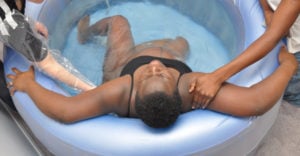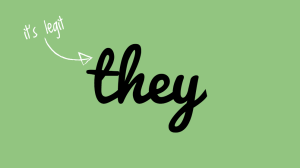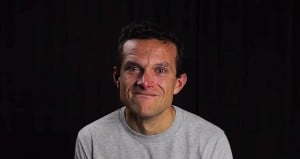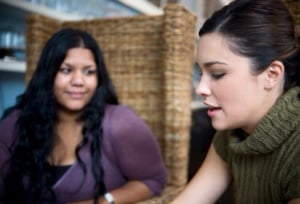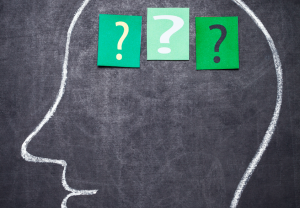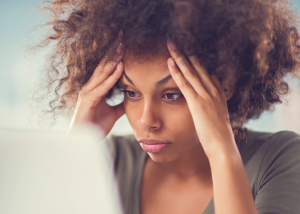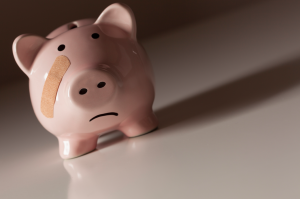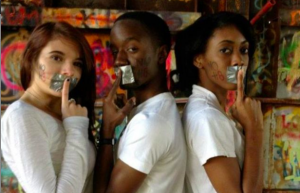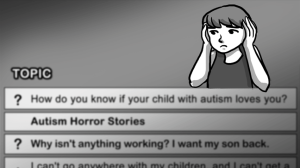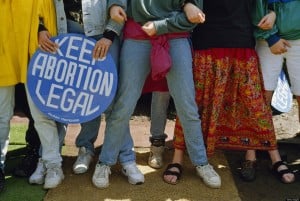At the age of 26, I found myself – someone who had been working as a counselor in a rehab facility – sitting in rehab as a client. In just a few short months, my life had come crashing down around me. How did I go from being a carefree party girl to full-blown alcoholic?
I had lots of “good” reasons to drink, and I always thought that everyone would drink if they were dealing with problems like mine.
I drank because I was depressed.
I drank to cope with the trauma of being a survivor of sexual violence.
I drank because my partner was abusive.
I drank because it made me feel funny and confident and vibrant.
I drank because life was really hard when I didn’t.
Navigating the world in a marginalized body can be hard. Add trauma and/or mental illness to that, and it makes sense that some of us might use substances to cope with the weight of living in a white supremacist cisheteropatriarchy.
Research seems to back this up.
Studies have found that between 50 and 96% of substance abusers seeking treatment report experiencing trauma; up to 34% of patients receiving substance abuse treatment have a PTSD diagnosis.
According to the National Alliance on Mental Illness, about a third of all people experiencing mental illnesses and about half of people living with severe mental illnesses also experience substance abuse.
A coping mechanism doesn’t have to be healthy to be valid; we’re all just doing the best we can with the tools that we have.
I Had Lots of Reasons to Think I Didn’t Have a Problem
Despite the fact that I had been admitted to a 30-day inpatient program, I still wasn’t convinced that I had a problem.
Despite the fact that many people in my life were concerned about my drinking, I had lots of reasons that I told myself I wasn’t an alcoholic.
I didn’t drink every day.
I didn’t drink in the morning (unless I’d been up all night and was still drinking. That didn’t count).
I was picky about what I drank. Just wine and champagne – and vodka if that was the only option. I could turn down whiskey, rum, or tequila, no problem.
I’d never had a DUI.
I didn’t drink alone. Even if I went to the bar alone, there were always people there, so that wasn’t technically “alone.”
I had a Master’s degree. I was pretty sure alcoholics didn’t have Master’s degrees.
And then one day, someone said to me, “It’s not about how much you drink; it’s about what happens when you drink and how you feel when you don’t.”
Oh.
With that one sentence, everything fell into place for me. I started to connect the dots about my behavior and, slowly, my denial began to crack. I recognized larger patterns of behavior and how they were reflective of my alcoholism. So how did I finally begin to understand that I had a problem?
1. I Always Drank More Than I Planned
I often went out with the intention of having “a couple glasses of wine.” I’d sit down at the bar, order a drink, and the next thing I’d hear was, “Last call!”
No matter what I told myself at the beginning of the night, I was never able to just have a couple of drinks. If my friends went home, I’d walk to a bar down the street and keep drinking. If I opened a bottle of wine, I always finished the bottle of wine.
Of course, there was always that one time I had consumed just two drinks – but I’d spend the rest of the night both patting myself on the back for my accomplishment and wishing I could have had more.
2. My Drinking Interfered with My Life
I was what people refer to as “a flake.” But really, I was just always drunk or hungover. I routinely missed work. At one point, I was calling out once per week. And if I wasn’t calling out, then I was late.
I canceled plans a lot, even if they were things I really wanted to do.
Sometimes because I was too hungover to get out of bed. Other times because I had started drinking and couldn’t be bothered to do what I was supposed to.
I missed job interviews I really wanted, parties for friends I really cared about, and dates with people I really liked. I spent rent money on booze and routinely called my parents to bail me out (I was lucky to have that option, I realize). I always had a dramatic story (that may or may not have been true) about why I didn’t do that Thing I Promised I Would Do.
3. I Often Drank to Black Out
I would wake up in the morning with no recollection of the night before. I woke up places I’d never been, with people I didn’t know, and no idea how I’d gotten there.
And instead of facing how scary the reality of these situations were, I’d tell myself that this was a sign of a great night.
What I would come to learn is that, while many people have experienced “blacking out,” most people don’t black out on a regular basis for years on-end.
4. I Routinely Did Things When I Was Under the Influence That I Wouldn’t Have Done Sober
I was the queen of drunk texting. I’d wake up and delete all my text messages before I couldn’t even read them because I didn’t even want to know.
I showed up at my exes houses at all hours of the night, throwing rocks at their window and begging them to come talk to me. I undressed in public.
And in the morning, I never wanted to hear about what I’d done the night before. “No, no, don’t tell me!” I’d plead.
I felt like Drunk Britni and Sober Britni were two different people, and Sober Britni had to deal with the consequences of Drunk Britni’s actions. And so I’d drink so I didn’t have to think about it anymore.
5. People in My Life Were Concerned About Me
Everyone I’d ever dated said to me, “I don’t like you when you drink. You’re like a different person.”
My parents pleaded with me to stop. Good friends stopped calling. I wasn’t invited to be in my childhood best friend’s wedding party.
“I think you need help” was something I heard on a regular basis.
I was pretty sure that those people just didn’t know how to have fun.
6. I Was Drinking to Fix How I Felt When I Was Sober
Drinking may have caused a lot of problems for me, but the real problem was how I felt when I was sober. When I was drunk, I was funny and confident. I was outgoing, I could talk to people, and I could go places.
When I was sober, I hated myself. I slept for twenty hours per day. I wanted to die. I didn’t open mail, do laundry, or take out my trash. When I was sober, I had anxiety about things. Life just seemed really hard.
When I was sober, instead of getting better, my life actually got progressively worse.
7. I Lied to People About How Much I Was Drinking
Even though I didn’t think I had a problem, I also had some awareness of the fact that other people might.
I tried to downplay how much and how often I was drinking so that people wouldn’t be worried about me.
“Oh, I just got here like half an hour ago,” I’d say, even though I’d been on the barstool since noon. “This is my second glass of wine,” I swore, even though it was really my second bottle.
I worried that if people knew the truth, I’d have to stop. And stopping was the scariest thing I could think of.
8. Drinking Controlled Where I Went, What I Did, and With Whom I Hung Out
I was way more likely to attend a function if I knew there would be booze there.
I could be friends with anyone as long as there was alcohol involved.
I avoided hanging out with people who didn’t drink like me because they made me feel like an alien. I would become obsessed with being able to drink the way I wanted to without “freaking anyone out.”
I drank in dive bars with no windows, where the bartender knew my name and my order and I could drink on credit if I didn’t have the money.
When I’d pull into the parking lot, I felt like I could finally breathe. I’d made it. Everything was going to be okay. It didn’t matter who was on the barstool next to me; they allowed me to convince myself that I wasn’t drinking alone.
9. I Kept Promising That I Would Stop, But Never Could
I tried to stop (or even cut back) drinking many times. I went to therapy. I went on antidepressants (several kinds, in fact). I moved across the country (and back again).
I dated lots of people. I had sex with lots of people. I joined the gym. I started meal planning. I joined three book clubs at once. I’d proclaim to all my Facebook friends that I was taking a month-long break from drinking, only to change my mind three days later because “now just isn’t a good time.”
I tried everything I could think of to stop drinking, but I could never go longer than a few days. I’d wake up after an epic bender, my life in shambles, and swear I’d never do that again.
As each day went by, it didn’t seem as bad as I thought. And I’d find myself back at the bar as if my life wasn’t falling down around me.
10. I Finally Realized That I Couldn’t Do This by Myself
By the time I agreed to seek treatment, I had lost my job, been kicked out of my apartment by my partner, and was dealing with chronic illness as a direct result of my using. The day I got sober was no different than any other day, really.
I was technically homeless and had been staying on a friend’s couch for the past several days. In that time, I hadn’t showered, and I smelled pretty rank. It was nine in the morning and I was still awake drinking wine and using cocaine – alone. I looked out the window at all of the people starting their days and I realized that, not only did I not know how to do that, but that I’d never known how to do that.
In that moment, I understood that I needed help, because if I could stop on my own, I would have done it already. I picked up the phone and called my partner.
“Okay, I’ll go to treatment.”
So You Think You Might Have a Problem – What Now?
If you’re reading this and thinking, “Wow, this sounds a lot like me,” then hi! I’m so glad you’re here. Knowing that other people thought and acted like me was a huge step towards getting well. It meant that I wasn’t abnormal, I wasn’t broken, and there was a solution.
As a first step, I encourage you to do some reading. Read other stories and blogs written by people with alcoholism. It’s a good way to feel less alone and to start to get an idea of what your life could be like without alcohol.
Only you can decide that your drinking is a problem.
If you’ve decided that you want to try to stop drinking but you’re not sure how, reach out for support. Talk to your friends or family, if you can. See a counselor, if you don’t already.
Check out twelve-step groups in your area, or look into SMART Recovery if twelve-step programs aren’t your thing. Maybe consider looking into online support groups if that feels safer for you.
There are lots of options out there for people who struggle with alcoholism. There’s not a one-size fits all solution, so find what works for you.
***
If you’ve read this far and relate to what’s written here, I want you to know that you are an incredible human. Recognizing that you have a problem is the beginning of a lifelong journey that can be incredibly difficult, but it’s one that you never have to take alone.
If no one has told you how strong you are yet today, let me be the first.
[do_widget id=’text-101′]
Britni de la Cretaz is a Feature Writer for Everyday Feminism. She is a feminist momma, community organizer, freelance writer, and recovered alcoholic living in Boston. She’s a founding member of Safe Hub Collective. Follow her on Twitter at @britnidlc. Read her articles here.
Search our 3000+ articles!
Read our articles about:
Our online racial justice training
Used by hundreds of universities, non-profits, and businesses.
Click to learn more






